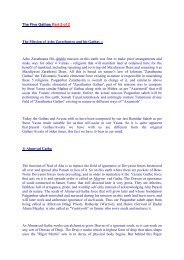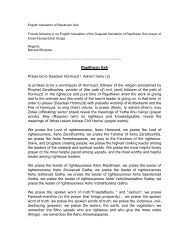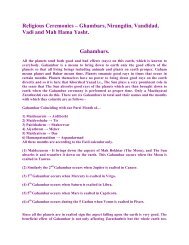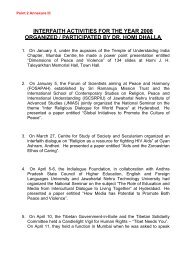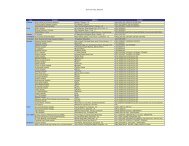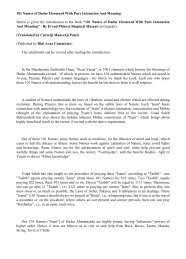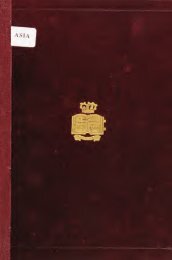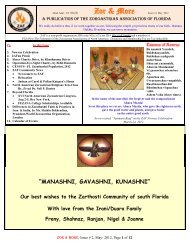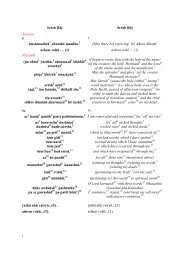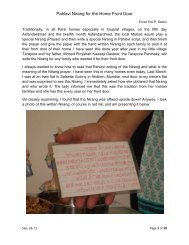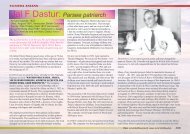The Sadu Nahn by Ervad Marzban Hathiram - WordPress â www ...
The Sadu Nahn by Ervad Marzban Hathiram - WordPress â www ...
The Sadu Nahn by Ervad Marzban Hathiram - WordPress â www ...
You also want an ePaper? Increase the reach of your titles
YUMPU automatically turns print PDFs into web optimized ePapers that Google loves.
<strong>The</strong> <strong>Sadu</strong> <strong>Nahn</strong> <strong>by</strong> <strong>Ervad</strong> <strong>Marzban</strong> <strong>Hathiram</strong><br />
<strong>The</strong> <strong>Nahn</strong><br />
We normally have a bath every day to keep our body physically clean.<br />
But the human body is composed of more than just the physical parts<br />
which we see. <strong>The</strong> Avesta says that the human body is made up of nine<br />
parts (for those eternal quote wallahs, doubting Thomases, and 'we<br />
believe it only when we see the scriptural reference' guys out here on<br />
theTZML, here is the reference: Yasna 55.1) - which are grouped in three<br />
parts of three bodies each:<br />
<strong>The</strong> physical group comprises of :<br />
1. Tanu - the fleshy body and skeletal system<br />
2. Gaetha - the internal organs<br />
3. Azde - the various liquids and circulatory systems.<br />
<strong>The</strong> ultra physical group comprises of :<br />
4. Keherp - the energy body where the 16 divine energy receiving,<br />
processing and transmitting centres known as<br />
Chakhras are located<br />
5. Ushtan-Ap - the life breath which is joined with the life breath of<br />
Zarathushtra during the Navjote ceremony<br />
6. Tevishi - the emotions body<br />
<strong>The</strong> divine group comprises of :<br />
7. Urvan / Ruvan - the original part of the Lord in us<br />
8. Baodangh - divine wisdom (this is Vohu Mano personified<br />
and not what many believe to possess in their<br />
physical minds)<br />
9. Fravashi - the spirit of implicit obedience to the will of the<br />
Lord (unlike many on this alias who seem to do<br />
what they want just because they perceive<br />
themselves to have a very good mind.)
<strong>The</strong> ultra physical group can also collectively be called the aipi of a<br />
person - his own personal space. Just as we have the normal bath for<br />
cleansing our physical bodies, the Zoroastrian religion enjoins different<br />
types of '<strong>Nahn</strong>s' for the cleansing of the ultra physical parts. Of these, the<br />
most simple one is called the '<strong>Sadu</strong> <strong>Nahn</strong>' or just simply the '<strong>Nahn</strong>'.<br />
Every thought, word and deed of ours is recorded at three parts in Nature.<br />
One of those three parts is our aipi or the personal space where our ultra<br />
physical bodies reside. If we stand with our arms bent at the elbows and<br />
the hands on our hips the expanse between the ends of the two elbows is<br />
our aipi. This aipi stores the records of all our thoughts, words and deeds,<br />
and several advanced Tibetan lamas can let you know what you have<br />
been up to <strong>by</strong> reading this aipi space.<br />
As the day goes <strong>by</strong>, our aipi becomes more and more polluted with the<br />
stamps of our not so good thoughts words and deeds. Some of this is<br />
remedied <strong>by</strong> the performance of the kusti at several times - for example<br />
after we visit the toilet. However, some part of this pollution remains and<br />
it is to cleanse this spiritual pollution that the <strong>Nahn</strong> is recommended to be<br />
taken preferably every few months.<br />
Now we see the procedure.<br />
1. On the day preceding the day when you want to take the nahn, get<br />
another person to collect the following ingredients:<br />
A. 6-7 leaves of the pomegranate tree<br />
B. 3-4 drops of the Nirangdin nirang (consecrated Nirang from<br />
the Nirangdin ceremony - ask your local Agiary to give you<br />
just this very small amount. Take a well washed and<br />
thoroughly dried small bottle to get it in. Do not take more,<br />
only as much as you can drink in three sips.)<br />
C. A small quantity of normal urine of the Varasyaji (again to<br />
be obtained from the Agiary where the Varasyaji is kept.<br />
Go in the evening, but before sunset with a clean, washed<br />
and dried glass bottle. Take enough to rub over your<br />
body - about 100 ml.)<br />
2. Arrange all these items on a copper tray (kalai ni khumchi),<br />
emptying the nirang and the taro in small kalai fulias. Place a clean<br />
handkerchief also. Cover with a clean mul mul cloth and keep in a<br />
segregated place.
3. Wash and completely dry the bathroom where you will take the<br />
<strong>Nahn</strong>. This is important. the bathroom should not be used during<br />
this time. <strong>The</strong> <strong>Nahn</strong> person should be the first one to use the<br />
bathroom in the early morning. <strong>The</strong> tray containing the ingredients<br />
should now be placed near the bathroom. Fill a bucket with clean<br />
water. Place a small mug filled with water next to the bucket.<br />
4. On the night preceding the <strong>Nahn</strong>, have a light meal. Do not have<br />
anything in the morning. Not even water. This is very very<br />
important.<br />
5. Get up early in the morning before the hustle and bustle of daily<br />
life begins (but after Sunrise). After the normal bodily functions<br />
are over, wash the face etc. then do one kusti. Pray the Sarosh Baj<br />
and the Havan gah. <strong>The</strong>n sit down in a clean place and with full<br />
devotion and humility recite the Patet Pashemani prayer. While<br />
saying this prayer, occupy your mind with just one thought - may<br />
my aipi be purified through this prayer and subsequent <strong>Nahn</strong>, and<br />
may I have the strength to withstand the onslaught of evil.<br />
6. Now go over to the bathroom, and standing near the tray of<br />
ingredients, first recite the 'Jamvani baj' prayer for taking food,<br />
given in any normal Khordeh Avesta. Now using the clean<br />
handkerchief as a paivand, or connector, lift the fulia containing the<br />
Nirangdin nirang in your hand, and recite in baj: 'In khuram, in<br />
paaki - i - tan, yaozdastri i ravaan raa' ('I take this for the cleansing<br />
of the body and the purification of my soul') Running this thought<br />
constantly in your mind take one sip from the fulia, and chew 2<br />
leaves of the pomegranate tree. Swallow the juice and spit out the<br />
pulp. Now recite this small formula again and take a second sip of<br />
the Nirang and chew another 2 leaves and spit out the pulp. Finally<br />
recite the formula a third time and take the final sip of the Nirang<br />
from the fulia and chew the final two leaves and spit out the pulp.<br />
Now keep the fulia down (not in the plate, but on the bathroom<br />
ground). Now finish off the remaining part of the Jamvani baj (4<br />
Yatha, 2 Ashem, Ahmai raescha...Kerfeh Mozd).<br />
7. Now untie the kusti silently and reciting the Hormazd khodae tie<br />
the kusti again.
8. Now take off all the clothes, and step into the bathroom proper and<br />
apply the normal taro all over the body, again running the thoughts<br />
of cleansing the aipi in your mind.<br />
9. Now recite the 'Nahvani baj' (prayer for taking the bath).<br />
10. Now wash your hands using the small mug filled with water the<br />
previous day. <strong>The</strong>n use the water in the bucket to have a proper<br />
bucket bath.<br />
11. Now wear a fresh set of clothes, and finish off the Nahvani baj.<br />
12. Now wash your face, hands upto the elbows and the exposed parts<br />
of the leg again (that is, do the Padyab) and untie and retie the kusti<br />
again including the Sarosh baj. <strong>The</strong>n recite the Havan gah, and sit<br />
down and recite the Patet once again, running the thought in the<br />
mind that 'may I have the good fortune to take such a <strong>Nahn</strong> again<br />
and again in my life'.<br />
Here ends the <strong>Nahn</strong> ceremony.<br />
Please bear in mind that this is a solemn ceremony and not some casual<br />
thing to do. Invest your time properly and make sure you follow all the<br />
rules given above. Please do not run down this solemn ceremony into a<br />
spectacle for others to see and chat about.



